This was for a version of the show before the Ronald D. Moore (2004) version and would have been produced/directed by Bryan Singer.



This was for a version of the show before the Ronald D. Moore (2004) version and would have been produced/directed by Bryan Singer.



I watch a lot of TV. A comfortable estimate is that in the last 20 years I’ve easily watched something like 15,000+ hours of television and have seen my share of TV series beginnings and endings. While most series are just plain bad, sometimes shows have bad beginnings but good endings like the US version of The Office and sometimes series have good beginnings but bad endings like Seinfeld, Lost, The X-Files and ER.
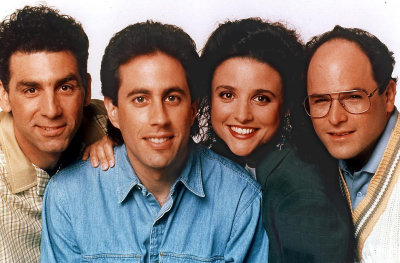
Recently, after doing some complaining of my own to friends about how the series Lost ended and there being discussion online about what really happened at the end of The Sopranos it got me thinking; do endings matter?
To a certain extent endings matter a great deal. A great show with a bad ending leaves a bit of a bad aftertaste. No matter how brilliant Battlestar Galactica (BSG) was or how many hundreds of hours of great programming we were left with after Seinfeld ended people still remember and bring up the endings of those two shows. While I personally liked the end of BSG I’d agree that the ending of Seinfeld was a stinker.
But it was thinking about a show exactly like Seinfeld that made me wonder if series endings were as important as everyone thinks?
Let’s look at a show like Lost. Arguably Lost, which was on TV for six seasons, had about three great seasons, a few alright ones and a bad last one. So watching Lost we got about 67 hours of spectacular story along with about 31 hours of good TV. Which ain’t half bad by any measure. You could watch Lost for nearly three days straight and be in total awe of what was going on all that time.
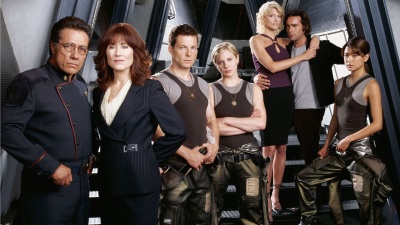
And maybe that’s why viewers are so upset with a show like Lost, that started out with such promise and slowly wasted away to a shadow of itself.
Even a show like BSG that had something like 53 hours of spectacular story and 19 hours of alright story people still argue about the ending not being in the spirit of the show and using lame sci-fi cliches. Again, I dug the ending.
Why do audiences get so fixated on endings? Why is there so much hate for Lost co-creators Damon Lindelof and Carlton Cuse who arguably entertained millions of people for years but who also presided over a turd of an ending? Why is it that people are still pestering The Sopranos creator David Chase to reveal what really happened in the last second of that series?
I think why endings matter so much to so many is that most of the time with series one episode leads to another and certain things blur together. Was it the same episode of ER that Quentin Tarantino directed where Doug Ross rescued that kid from a flooded sewer, or were they different? Did David Duchovney leave The X-Files before or after the show moved to California? But with the last episode it’s the last thing people see and remember and if they’re in a heightened emotional state at the time with their favorite series going away and if the last episode is a letdown, well then Lost is total crap and The X-Files ultimately sucked.
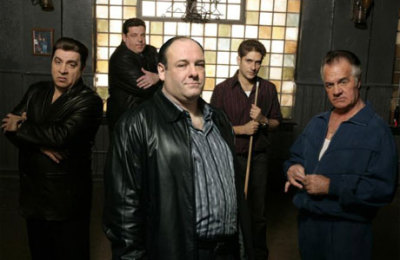
But I’ve thought for a long while that just the opposite is true. Sure, I was let down by the end of Lost and stopped watching The X-Files before the last season of that show, but I knew enough at the time to enjoy the ride when the shows were still good rather than to focus on the last stop as it were.
Even with most shows that are really good are only like that for a few seasons a the most. After a while creators start to run out of original story ideas and old plots from previous seasons start getting recycled and new blood is brought onto write for the show with different ideas that might not be in the spirit of where things started.
I think the trick is to realize that at best even great shows are only going to be great for a little while. And that even if they are great until the end there’s little chance the ending is going to be something that appeals to everyone.
With series TV it’s the ride that counts, not the destination.
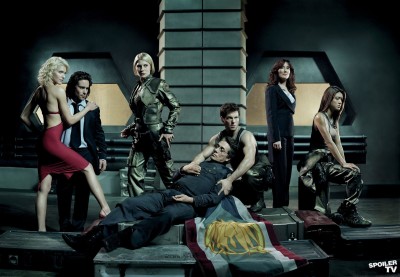
Back in late 2003 the newspaper the Fort Wayne Reader was just starting up and I was asked to write a pop-culture column for them. Work was started on the paper months in advance of the first issue being published and one of the things the publishers of the Reader did in those early days was to reach out to TV networks and cable channels for screeners of TV series and movies to review for the paper.
That’s how I got to watch the new Battlestar Galactica TV mini-series a few weeks before everyone else.
Though the copy we received was missing some special effects shots in places, I was none-the-less “blown away” at how good the mini-series was when I was totally prepared for it to be a bust since it had suffered from months and months of negative publicity beforehand. Fans, myself included, didn’t like the idea that a sci-fi classic was being rebooted without the participation of the original creator nor the fact that one of the lead characters of the original series was now going to be played by a (gasp!?) woman!
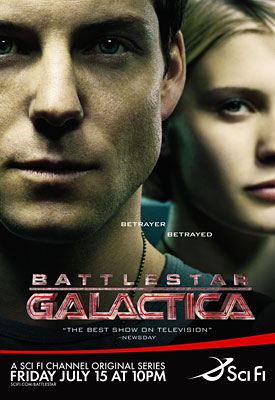
I think what we forgot to take into account was that it’s the 21st century so why not shake things up a bit and have a woman play a role originally meant for a man? And while we might have some nostalgia for the original 1970s Battlestar Galactica series, looking back in retrospect the series wasn’t all that great so there was a lot that could be improved on.
But from the moment in the new mini-series that the Cylons came pouring out of space in search of vengeance against losing a war decades earlier against humanity I was hooked and couldn’t wait for the next part of the story. Simply put, BSG was one of the best sci-fi shows ever and probably one of the best TV series of all time too. It’s certainly one of the best series of the first decade of the 21st century. BSG dealt with all sorts of taboo subjects like abortion, terrorism, genocide, military rule, etc., etc., etc., that was all done in the guise of sci-fi so it didn’t come off as that controversial. In fact I’m not sure there’s been ANY series sci-fi or not since that’s dealt with as many heavy subjects as BSG did throughout its run.
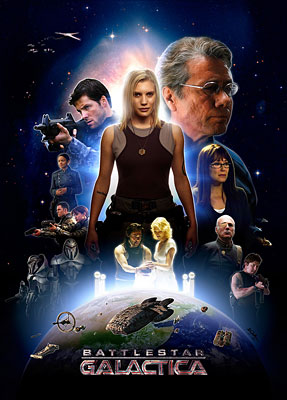 And let’s not forget to what the TV landscape was like when the BSG series premiered in ’04. Shows like Lost, Veronica Mars, The Wire, The Sopranos, Arrested Development and the UK version of The Office were all airing new episodes when the BSG series started. To say this was an extremely special time for TV would not be an understatement. I don’t think we’ve had such quality of shows on all at once since then.
And let’s not forget to what the TV landscape was like when the BSG series premiered in ’04. Shows like Lost, Veronica Mars, The Wire, The Sopranos, Arrested Development and the UK version of The Office were all airing new episodes when the BSG series started. To say this was an extremely special time for TV would not be an understatement. I don’t think we’ve had such quality of shows on all at once since then.
I’ve always had a sneaking suspicion that the Sci-Fi Channel didn’t have much hope in BSG attracting viewers, that’s why the BSG mini-series premiered in December of ’03 with the regular series not starting up until months later in October of ’04. I think Sci-Fi was caught by surprise that the mini-series was so well regarded by critics and fans alike, was watched by so many and received as many accolades as it did. Heck, the mini-series received three Emmy nominations — when does that happen EVER for sci-fi?
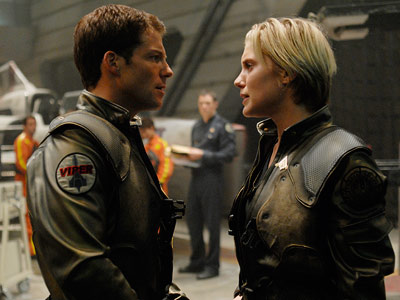
One of the things I liked best about BSG was that series creator Ronald D. Moore began recording commentary podcasts that would be released after each new episode aired. These podcasts revealed behind the scenes goings on at the show, what was cut from each episode and where scenes were filmed and how things were tied together. I can only imagine the amount of work Moore put into each episode and then to also invest time recording podcasts on top of all his other duties too was immense.
Now that I think about it, the only way I can relate to how much I loved the series, how much I enjoyed each new episode, was that BSG was so good it literally hurt when each new episode ended.
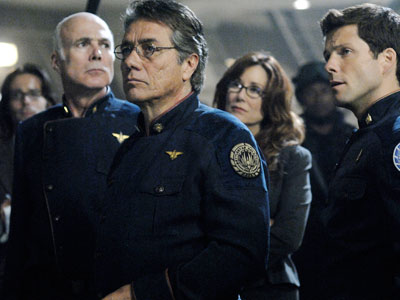
In the last decade the Sci-Fi Channel, now Syfy, hasn’t aired anything to the quality of BSG. While other networks draw viewers with shows like The Walking Dead (AMC), Doctor Who (BBC America), American Horror Story (FX) and Falling Skies (TNT), all sci-fi/horror series that would seemingly be at home on Syfy, instead that channel has come to rely on cheap reality shows like Fangasm, Ghost Mine and Heroes of Cosplay and cheaply made movies like Sharknado in order to fill the hours. And while these shows might garner some viewers, they’ve also driven away hoards of sci-fi loving viewers like me to other channels. I used to love the SCI-Fi Channel for its programming like BSG, Farscape, MST3K and Sliders to name a few. But honestly, Syfy has changed so much that I can’t say that I’ve watched all that much on that channel the last five years.
But all is not lost. There are several shows scheduled on Syfy in 2014 that look like they might be a return to the greatness of series like BSG. One of which is a Ronald D. Moore created Helix that’s set to debut Friday, January 10. The same time BSG used to air “back in the day.”
All episodes of Battlestar Galactica are available for streaming on Netflix and Amazon and the series is also available on Blu-ray.
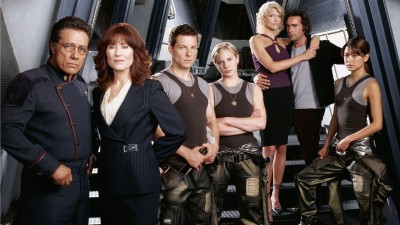
I’m currently working on an article on Battlestar Galactica that’s set to be published on the tenth anniversary of the premiere of the TV mini-series this December. Looking back I’ve actually written quite a bit on BSG over the years. I thought, and still think, that I was lucky to be alive when new episodes were being produced. (Or, how can you tell if someone’s really into TV? They say things like “lucky to be alive” when talking about TV series.)
Here’s most of the longer pieces I’ve written on BSG since the premiere of the show:
This doesn’t include shorter blog posts because, in my infinite wisdom, I made it practically impossible to link to specific older blog posts when I archived my blog content off an older CMS I built myself. Note to self, never work in ASP again. 😉